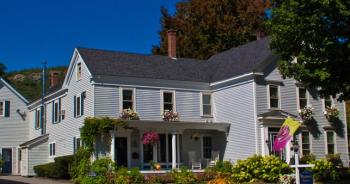Camden board moves innkeeper’s proposal to town leaders
CAMDEN — Voting 4 to 1, the Camden Planning Board reversed an earlier decision made last May and is now sending a proposed zoning amendment to Camden leaders for consideration. The vote came on the heels of a four-hour public hearing July 2, at which citizens, innkeepers and other local business owners delivered testimony to the pros and cons of Kristi Bifulco’s specific request that town ordinance be adjusted to allow her to seek approval to serve dinner to her overnight guests.
Bifulco and her husband, Jesse, are owners of the eight-room Windward House, at 6 High Street (Route 1), in Camden, just north of the public library.
The approval by the Planning Board means the proposal will go next to the Camden Select Board, which will decide whether to place it before Camden voters at a town meeting.
The Camden Planning Board consists of Chairman Lowrie Sargent, John Scholz, Richard Bernhard, Jan McKinnon and Richard Householder.
“There are still quite a lot of hurdles to go through,” said Planning Board Chairman Lowrie Sargent, at the end of the hearing. He noted that even if the Select Board sends it on to the voters, and if the Camden electorate approves, the process would still require that Bifulco takes an application to the Camden Zoning Board of Appeals for a special exception to current zoning.
And even if that happens, Bifulco still needs a license from the state to make dinner for her guests.
Nonetheless, the 4 to 1 vote signaled a victory to Bifulco, who has been working since last winter to gain planning board approval for a zoning change that has earned much debate.
She had crafted an amendment that would be included in the town’s definition of inns and would effectively allow an inn abutting High Street and within 500 feet of a zone where restaurants are already allowed the possibility of being granted a special exception “to be allowed to serve meals to overnight guests only, subject to meeting the standards of a Low Impact Use as determined by the Zoning Board of Appeals.”
Those opposed to the measure cited a slippery slope of ordinance changes that erode the integrity of the town’s zoning. They said allowing an inn in that 500-foot stretch of Camden to serve dinner would negatively affect other restaurant owners in town who are trying to make a living.
They also objected to the practice of special exceptions, spot zoning and contract zoning, saying the town’s comprehensive plan should be nexus for considering and recommending ordinance changes. The comprehensive plan is currently undergoing a revision.
Opponents also said the northern gateway to Camden, which lies within a historic district, deserves protection so that the town does not begin to resemble Bar Harbor, Boothbay and Freeport.
“This is not a referendum on small businesses, it's about, ‘are serious about zoning or not, is it a commercial activity in a residential zone or not,’” one citizen asked, rhetorically.
Supporters said the economy has changed enough, and that the competition presented via the Internet (e.g., couch surfing, renting apartments and homes to tourists) has grown, so much so that innkeepers must get more creative in attracting guests and building a more solid business base.
They said the effect on the immediate residential neighborhood would be minimal, given that the Windward House already operates as a commercial entity, along with two other B&Bs in the 500-foot-stretch under discussion.
“It's the very definition of low impact,” said one supporter.
They said the town needs to support, “small business run by community-minded people who are inherently invested in the fabric of the town.”
Whether the other two inns in that stretch — Abigail’s and Hawthorn — eventually seek approval to serve dinner to their overnight guests, as well, is not known. Beth O’Connor, coowner of the four-room Abigail’s Inn said she would not pursue approval for such a development this year, but did not discount the possibility in future seasons.
Bifulco said the Windward House posts and average 70 to 80 percent occupancy rate in the high season and a 2 to 5 percent rate from December through May. She anticipates hiring two more people, if she is allowed to serve dinner. Currently, she employs three workers who work in the morning tending to housekeeping and cleanup.
“My husband and I do most of the work,” said Bifulco.
On May 15, the board nixed the proposed ordinance change. The vote was 2 to 2 (Bernhard and Scholz opposing, Sargent and McKinnon supporting), a split opinion on whether Bifulco’s proposed amendment to the town’s zoning ordinance should be sent on for further consideration and eventual placement before a citizen vote at town meeting.
But because one board member was absent that night, the Planning Board unanimously agreed at its June meeting to hold another public hearing when the entire board would be present.
In the board’s July 2 discussion about the zoning proposal, members acknowledged that more work must be accomplished to clarify definitions within the ordinance of inns, bed and breakfasts and other businesses. They cited the need to regulate signage better, and develop a more detailed process by which zoning amendment proposals are received and considered.
Board member Scholz said town ordinances and the comprehensive plans are intertwined, and are flexible documents that are subject to change, though changes are not to be done “frivolously.”
“I share that the process of planning is important to the town, but I'm not too sure about holding any proposal hostage to moving to voters to see what others think about it,” he said. Zoning and the economic vitality of community have to be balanced. I am inclined to think that this should be considered in going forward and let the voters decide.”
Board member Householder was skeptical that additional traffic would be generated by serving dinner at the Windward House to overnight guests; nor would it be a new business.
“There are inns all up and down High Street,” he said.
Board member Bernhard countered, however, and said there will be subsequent costs born by the existing restaurants forced to compete with another eatery. He also cited the cost to High Street itself and the “investments people have made to properties along that street.”
Board Chairman Sargent said the 500-foot limitation “is a little strange.”
No one, apparently, knows the origin of that 500-foot language about High Street, even former planning board and select board members, some of whom were attending the meeting.
As for establishing standards for zoning amendments, Sargent said: “We need to do this.”
At the end of the four-hour hearing, the board voted in favor of a motion to send the Bifulco proposal to the Select Board for consideration of inclusion on a town warrant. Bernhard was the lone vote against that measure.
Related stories
Innkeeper’s effort to serve overnight guests dinner back before Camden Planning Board
... CAMDEN — Wednesday evening will be round two of Camden Planning Board’s ... for serving dinner to guests. Since last winter, one Camden innkeeper has been working on language that would loosen the rules and broaden ...Camden Planning Board nixes innkeeper’s quest to serve dinner to guests
... CAMDEN — A proposed ordinance change that would have allowed a Camden innkeeper to seek permission from the Zoning Board of Appeals to serve dinner ...
Event Date
Address
6 high street
camden, ME
United States

























